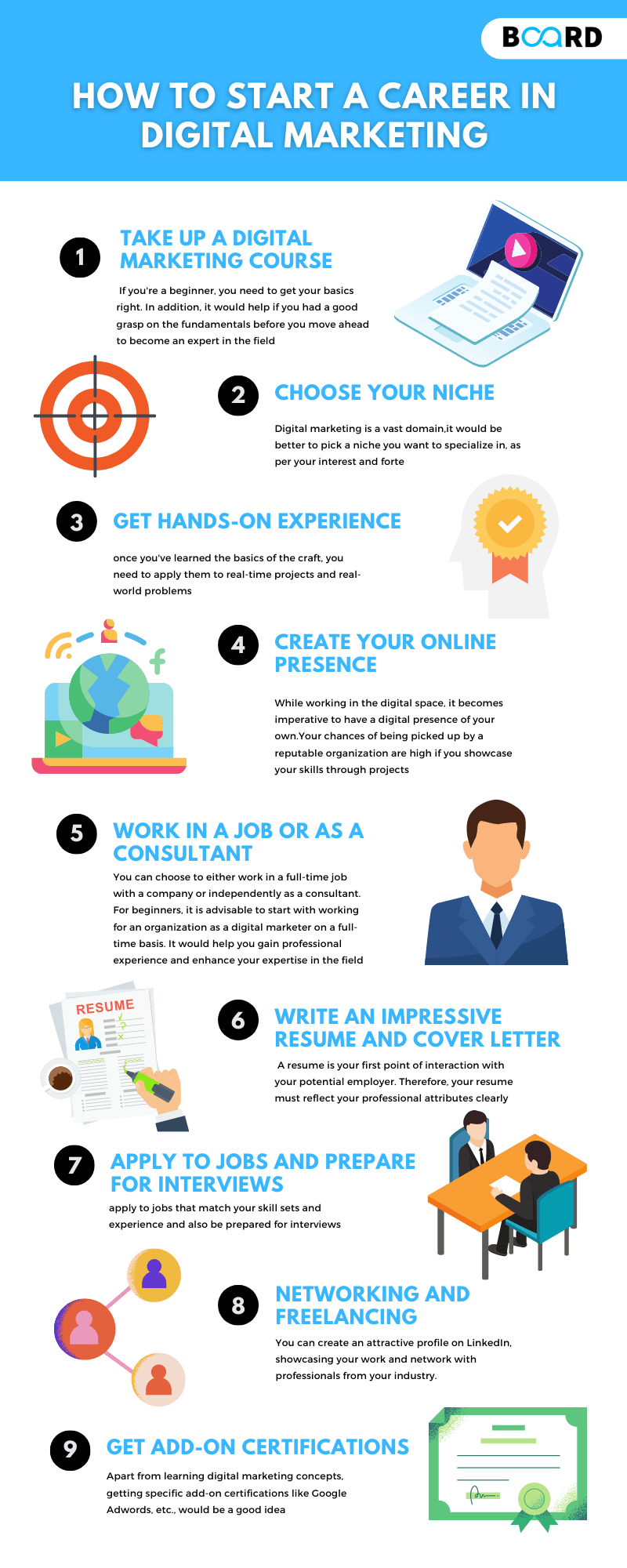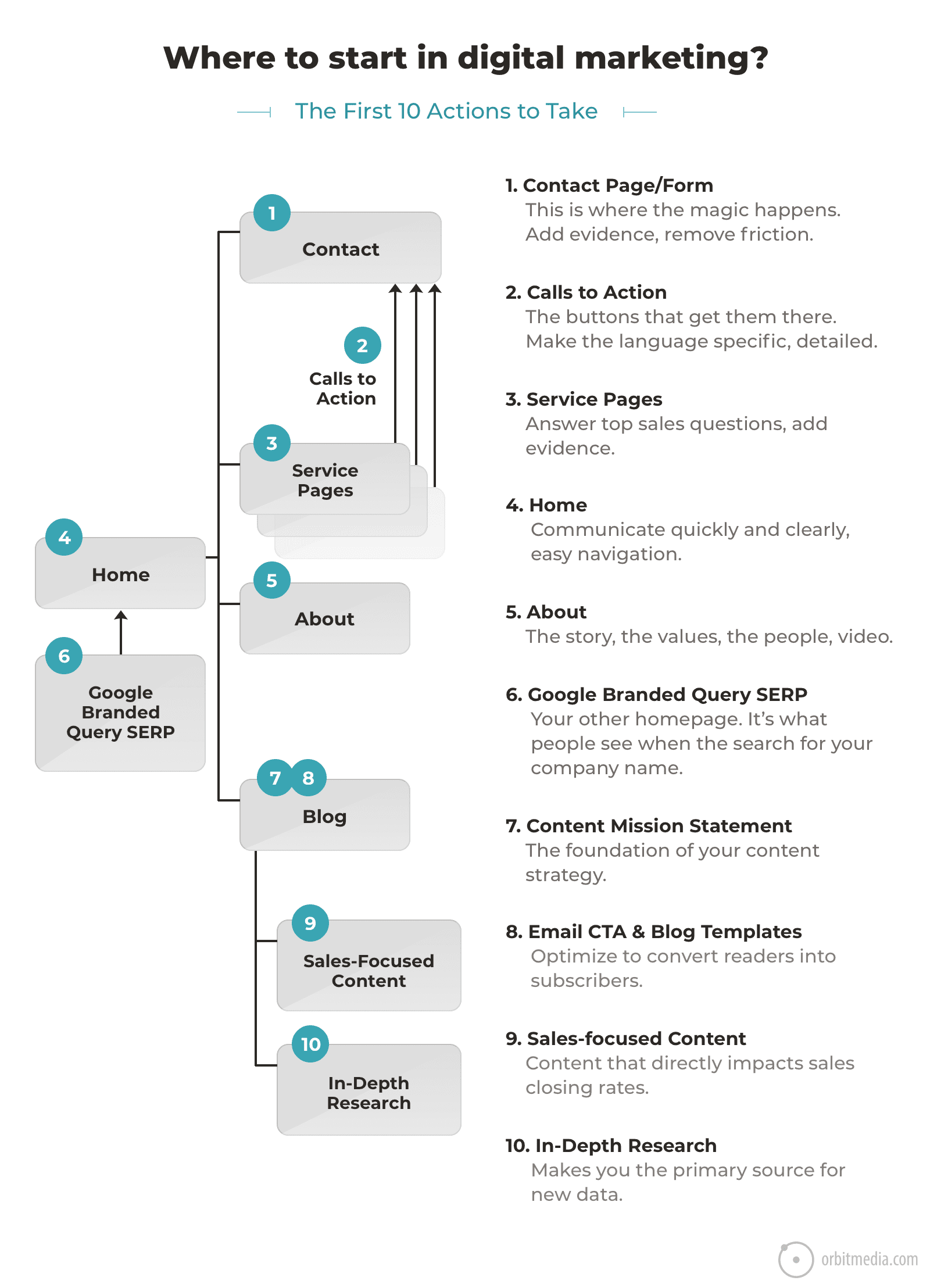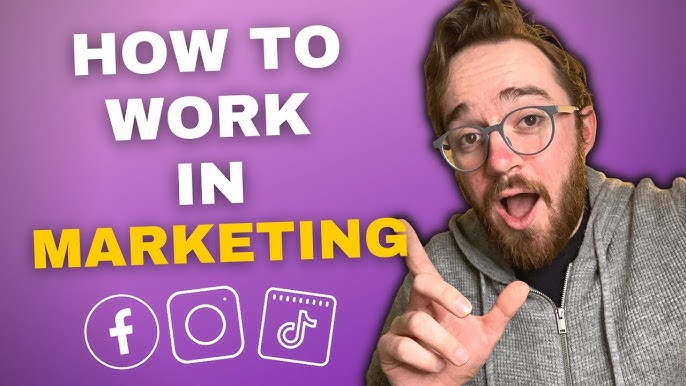Marketing is a dynamic and ever-evolving field that offers diverse opportunities for those looking to build a career in creativity, strategy, and communication. Whether you're a recent graduate, a career changer, or simply curious about the industry, understanding how to get started in marketing is the first step toward success. This guide will walk you through the essential skills, tools, and strategies needed to break into the field, as well as practical tips for landing your first marketing job. From building a strong foundation to networking effectively, discover how to navigate the competitive landscape and kickstart your marketing career with confidence.
How to Get Started in Marketing and Land a Marketing Job
1. Understand the Basics of Marketing
To get started in marketing, it’s essential to understand the fundamentals. Marketing involves promoting products or services to attract and retain customers. Key areas include digital marketing, content marketing, social media marketing, and SEO. Familiarize yourself with these concepts through online courses, books, or blogs. Platforms like Coursera, HubSpot Academy, and Google Digital Garage offer free or affordable resources to build your knowledge.
See Also As a Marketer, What Do You Actually Do?
As a Marketer, What Do You Actually Do?2. Build a Strong Foundation with Education and Certifications
While a degree in marketing, business, or communications can be helpful, it’s not always mandatory. Many professionals enter the field with certifications like Google Ads, Facebook Blueprint, or HubSpot Content Marketing. These certifications demonstrate your expertise and commitment to potential employers. Additionally, consider taking courses in data analysis and graphic design to broaden your skill set.
3. Gain Practical Experience Through Internships or Freelancing
Hands-on experience is crucial in marketing. Look for internships, volunteer opportunities, or freelance projects to apply your skills in real-world scenarios. Platforms like Upwork, Fiverr, or LinkedIn can help you find freelance gigs. Internships, even unpaid ones, provide valuable networking opportunities and a chance to build your portfolio.
See Also Help! How do I have people opt-it to receive emails, without spamming them?
Help! How do I have people opt-it to receive emails, without spamming them?4. Create a Portfolio to Showcase Your Skills
A strong portfolio is a must for landing a marketing job. Include examples of campaigns, content creation, social media management, or SEO projects you’ve worked on. If you’re just starting, create mock campaigns or volunteer to manage social media for a local business. Use tools like Canva or Adobe Spark to design visually appealing presentations of your work.
5. Network and Apply for Marketing Jobs
Networking is key in the marketing industry. Attend industry events, join LinkedIn groups, and connect with professionals in the field. Tailor your resume and cover letter to highlight relevant skills and experiences. Use job boards like Indeed, Glassdoor, or MarketingHire to find openings. Don’t hesitate to reach out to recruiters or hiring managers directly.
See Also How do you effectively send mass emails without being marked as spam?
How do you effectively send mass emails without being marked as spam?| Step | Action | Resources |
|---|---|---|
| 1 | Learn Marketing Basics | Coursera, HubSpot Academy, Google Digital Garage |
| 2 | Get Certified | Google Ads, Facebook Blueprint, HubSpot Content Marketing |
| 3 | Gain Experience | Internships, Freelancing (Upwork, Fiverr) |
| 4 | Build a Portfolio | Canva, Adobe Spark, Mock Campaigns |
| 5 | Network and Apply | LinkedIn, Indeed, Glassdoor, MarketingHire |
How can I work in marketing with no experience?

How to Build a Foundation in Marketing Without Experience
Starting a career in marketing without prior experience requires building a strong foundation. Begin by educating yourself on the basics of marketing principles, tools, and strategies. Here’s how you can do it:
See Also Zero to 100k on LinkedIn (2 years): 8 Rules For Success!
Zero to 100k on LinkedIn (2 years): 8 Rules For Success!- Take online courses: Platforms like Coursera, HubSpot Academy, and Google Digital Garage offer free or affordable marketing courses.
- Read marketing books and blogs: Books like Contagious by Jonah Berger and blogs like Neil Patel’s can provide valuable insights.
- Follow industry leaders: Stay updated by following marketing experts on LinkedIn, Twitter, and other platforms.
Gaining Practical Experience Through Internships and Volunteering
Practical experience is crucial, even if it’s unpaid or part-time. Internships and volunteering can help you gain hands-on experience and build your resume:
- Apply for internships: Many companies offer internships for beginners, which can lead to full-time roles.
- Volunteer for non-profits: Offer your marketing skills to small organizations or local businesses to build a portfolio.
- Work on personal projects: Create mock campaigns or manage social media accounts for friends or family to showcase your skills.
Leveraging Transferable Skills from Other Fields
If you’re transitioning from another field, identify and highlight transferable skills that are valuable in marketing:
- Communication skills: Writing, public speaking, and storytelling are essential in marketing.
- Analytical skills: Data analysis and problem-solving are highly sought after in marketing roles.
- Project management: Organizational and leadership skills can help you manage campaigns effectively.
Building a Personal Brand and Online Presence
Your personal brand can set you apart in the marketing industry. Start by creating a professional online presence:
- Optimize your LinkedIn profile: Highlight your skills, certifications, and any relevant projects.
- Create a portfolio website: Showcase your work, even if it’s from personal projects or volunteer work.
- Engage on social media: Share marketing insights, comment on industry trends, and network with professionals.
Networking and Connecting with Industry Professionals
Networking is a powerful tool for breaking into marketing. Building relationships can lead to job opportunities and mentorship:
- Attend industry events: Join webinars, conferences, and local meetups to meet professionals.
- Join online communities: Participate in marketing forums, Facebook groups, and Slack channels.
- Reach out to professionals: Send personalized messages to marketers on LinkedIn to ask for advice or informational interviews.
How do I start working as a marketer?

Understanding the Basics of Marketing
To start working as a marketer, it is essential to understand the fundamentals of marketing. This includes learning about the 4 Ps of marketing (Product, Price, Place, Promotion) and how they interact to create successful campaigns. Additionally, familiarize yourself with key concepts such as target audience, brand positioning, and customer journey.
- Study the 4 Ps of marketing to grasp the core elements of any marketing strategy.
- Learn about consumer behavior to understand how customers make purchasing decisions.
- Explore different marketing channels such as social media, email, and content marketing.
Building a Strong Educational Foundation
While not always mandatory, having a formal education in marketing or a related field can significantly boost your credibility. Consider pursuing a degree in marketing, business administration, or communications. Alternatively, you can take online courses or certifications from platforms like Coursera, HubSpot Academy, or Google Digital Garage to build your knowledge base.
- Enroll in a marketing degree program at a university or college.
- Complete online certifications to gain specialized skills in areas like digital marketing or SEO.
- Attend workshops and webinars to stay updated on the latest marketing trends.
Gaining Practical Experience
Practical experience is crucial in marketing. Start by working on personal projects, such as creating a blog or managing social media accounts for a small business. You can also look for internships, freelance gigs, or entry-level positions to gain hands-on experience. Building a portfolio of your work will help you showcase your skills to potential employers.
- Create a personal blog or website to practice content creation and SEO.
- Volunteer to manage social media accounts for local businesses or non-profits.
- Apply for internships or entry-level jobs in marketing departments.
Developing Essential Marketing Skills
To succeed as a marketer, you need to develop a diverse set of skills. Focus on improving your analytical skills to interpret data and measure campaign performance. Enhance your communication skills for effective storytelling and collaboration. Additionally, learn how to use marketing tools like Google Analytics, Hootsuite, and Canva to streamline your work.
- Practice data analysis to understand campaign metrics and ROI.
- Work on your writing and presentation skills to communicate ideas effectively.
- Familiarize yourself with marketing software and tools to improve efficiency.
Networking and Building Professional Relationships
Networking is a vital part of starting a career in marketing. Attend industry events, join professional organizations, and connect with other marketers on platforms like LinkedIn. Building a strong professional network can open doors to job opportunities, collaborations, and mentorship.
- Attend marketing conferences and workshops to meet industry professionals.
- Join online communities and forums related to marketing to share knowledge and insights.
- Engage with mentors and experienced marketers to gain guidance and advice.
How do I start marketing?

Understanding Your Target Audience
To start marketing effectively, the first step is to understand your target audience. This involves identifying who your potential customers are, their needs, preferences, and behaviors. Here’s how you can do it:
- Conduct market research to gather data on demographics, interests, and purchasing habits.
- Create buyer personas to represent your ideal customers and tailor your marketing strategies accordingly.
- Analyze competitors to see how they are targeting similar audiences and identify gaps in the market.
Defining Your Unique Selling Proposition (USP)
Your Unique Selling Proposition (USP) is what sets you apart from competitors. It’s crucial to clearly define what makes your product or service unique. Follow these steps:
- Identify your strengths and what you offer that others don’t.
- Focus on customer benefits rather than just features.
- Communicate your USP consistently across all marketing channels.
Choosing the Right Marketing Channels
Selecting the appropriate marketing channels is essential to reach your audience effectively. Consider the following:
- Evaluate digital platforms like social media, email, and search engines based on where your audience spends time.
- Consider traditional methods such as print ads, TV, or radio if they align with your audience’s preferences.
- Test and measure the performance of each channel to optimize your strategy.
Creating a Marketing Plan
A well-structured marketing plan is the backbone of your efforts. It outlines your goals, strategies, and tactics. Here’s how to create one:
- Set clear objectives such as increasing brand awareness or driving sales.
- Allocate a budget for each marketing activity to ensure resources are used efficiently.
- Develop a timeline to track progress and adjust strategies as needed.
Implementing and Monitoring Campaigns
Once your plan is ready, it’s time to implement and monitor your campaigns. This ensures you stay on track and achieve your goals. Follow these steps:
- Launch campaigns across chosen channels and ensure consistency in messaging.
- Track key metrics like engagement, conversions, and ROI to measure success.
- Adjust strategies based on data insights to improve performance over time.
Where do I start from to learn marketing?

Understanding the Basics of Marketing
To start learning marketing, it is essential to grasp the fundamental concepts that form the foundation of the field. Marketing involves understanding customer needs, creating value, and building strong customer relationships. Here are some key steps to begin:
- Study the 4 Ps of Marketing: Product, Price, Place, and Promotion are the core elements of any marketing strategy.
- Learn about market research: Understand how to gather and analyze data about your target audience and competitors.
- Explore consumer behavior: Gain insights into how and why customers make purchasing decisions.
Building a Strong Foundation with Marketing Courses
Enrolling in structured marketing courses is one of the most effective ways to learn marketing. These courses provide a comprehensive understanding of the subject and often include practical exercises. Consider the following:
- Online platforms: Websites like Coursera, Udemy, and HubSpot Academy offer beginner-friendly marketing courses.
- University programs: Many universities offer marketing degrees or certifications that cover both theory and practice.
- Specialized certifications: Look for certifications in digital marketing, content marketing, or social media marketing to build expertise.
Practicing Marketing Skills Through Real-World Applications
Once you have a basic understanding, it’s crucial to apply your knowledge in real-world scenarios. Practical experience helps solidify your skills and builds confidence. Here’s how to get started:
- Start a personal project: Create a blog, social media page, or small business to practice marketing strategies.
- Volunteer or intern: Offer your skills to non-profits or small businesses to gain hands-on experience.
- Analyze case studies: Study successful marketing campaigns to understand what works and why.
Staying Updated with Marketing Trends and Tools
Marketing is a dynamic field that constantly evolves with new trends and technologies. Staying updated is essential to remain competitive. Focus on the following:
- Follow industry blogs: Websites like HubSpot, Neil Patel, and Marketing Land provide valuable insights.
- Use marketing tools: Familiarize yourself with tools like Google Analytics, SEMrush, and Hootsuite.
- Attend webinars and conferences: These events offer opportunities to learn from experts and network with professionals.
Networking and Learning from Marketing Professionals
Building a network of marketing professionals can provide mentorship, guidance, and opportunities for collaboration. Here’s how to connect with others in the field:
- Join marketing communities: Platforms like LinkedIn and Reddit have active marketing groups.
- Attend local meetups: Look for marketing events or workshops in your area.
- Seek mentorship: Reach out to experienced marketers for advice and feedback on your progress.
Frequently Asked Questions from Our Community
What skills are essential to start a career in marketing?
To begin a career in marketing, you need a mix of hard and soft skills. Key hard skills include data analysis, SEO/SEM, content creation, and proficiency in tools like Google Analytics or social media platforms. Soft skills such as communication, creativity, and problem-solving are equally important. Additionally, understanding consumer behavior and staying updated with marketing trends will give you a competitive edge.
How can I gain practical experience in marketing?
Gaining practical experience is crucial for breaking into marketing. Start by internships or freelance projects to build your portfolio. You can also create your own projects, such as managing a personal blog or running social media campaigns for small businesses. Volunteering for non-profits or joining marketing clubs at your school can also provide hands-on experience. Networking with professionals and attending industry events can open doors to opportunities.
What qualifications do I need to land a marketing job?
While a degree in marketing, business, or a related field is often preferred, it’s not always mandatory. Many employers value practical experience and certifications over formal education. Consider earning certifications like Google Ads, HubSpot Content Marketing, or Facebook Blueprint to showcase your expertise. Building a strong online presence and a portfolio of successful projects can also make you stand out to potential employers.
How do I prepare for a marketing job interview?
Preparing for a marketing job interview involves researching the company, understanding its target audience, and analyzing its marketing strategies. Be ready to discuss your past experiences, such as campaigns you’ve managed or results you’ve achieved. Practice answering common questions about marketing trends, tools, and strategies. Additionally, prepare a few questions to ask the interviewer about the company’s marketing goals and challenges. Demonstrating your enthusiasm and problem-solving mindset can leave a lasting impression.
Leave a Reply


Articles of interest